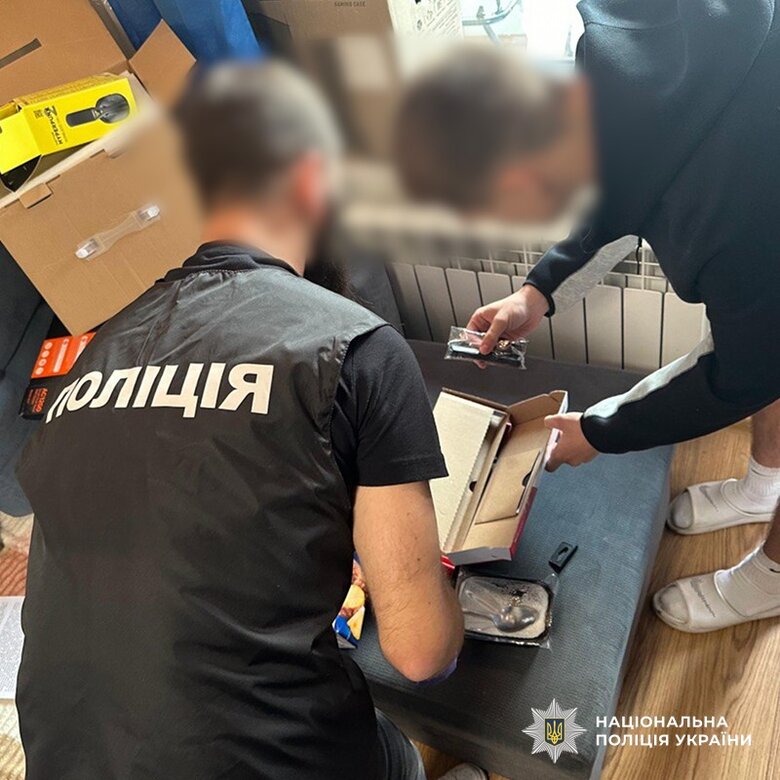Cocaine smuggling from Honduras worth UAH 8 million per month: Criminal group detained – National Police. VIDEO+PHOTOS
Members of a criminal group involved in monthly cocaine shipments have been exposed. The group was receiving up to 30 drug-containing parcels each month. The trafficking route spanned three continents: from Honduras in North America to Panama in South America, and then on to Ukraine. The senders concealed the cocaine in vacuum-sealed packages hidden inside the walls of cardboard boxes. The leader of the drug syndicate and his accomplices have been formally served with charges.
This was reported by the National Police, Censor.NET reports.
It was established that a 44-year-old Kyiv resident, who had lived in the United States for an extended period, organized the cocaine smuggling operation from Central American countries. While in the U.S., he had repeatedly drawn the attention of law enforcement, served a prison sentence for financial fraud, and was eventually deported.
In 2018, Ukrainian law enforcement detained him twice for drug smuggling. Both cases are still pending in court. Despite this, the man continued his criminal activities. To manage orders, he created a website through which "clients" could purchase cocaine, receive payment instructions, and arrange delivery. The drugs were supplied by his foreign partners. Communication between the supplier and the Ukrainian dealer was conducted in English and Spanish. To facilitate large-scale distribution of narcotics across Ukraine, the man enlisted accomplices, assigning them specific roles in the scheme — from administering a Telegram channel used for customer orders to delivering the drugs to buyers.
To avoid detection during customs inspections, the cocaine was meticulously concealed. Foreign senders hid the drugs in vacuum-sealed rectangular packages, which were placed inside the walls of cardboard boxes. The prepared parcels were filled with clothing, everyday items, or office equipment and then shipped from Honduras through Panama to the Ukrainian capital.
In Kyiv, the leader of the drug trafficking group personally collected the parcels using forged identification documents with fake personal data at an international parcel delivery office. Upon receipt, he would always check the integrity of the packaging and extract the cocaine, which was compressed into solid plates. Each month, between 20 and 30 parcels arrived in Kyiv, each containing approximately 100 grams of cocaine. The trafficker spent around $30,000 on purchasing the drugs and earned up to $100,000 from their sale.
The drugs were subsequently divided into batches, and his accomplices created "cocaine stashes" across various districts of the capital and surrounding region. Wholesale drops within the group were referred to as "master stashes," each potentially containing up to 1,000 doses of cocaine. An additional service offered was direct delivery to the client's residence — a "convenience" that cost $30. The traffickers also sold cocaine via postal shipments, while lower-level dealers distributed it at retail using hand-to-hand transactions.
All payments were made exclusively in cashless form via cryptocurrency wallets. Funds were transferred through so-called "drops" — transit bank cards used to funnel money to accounts of affiliated individuals who, for a fee, provided their personal information to create the digital wallets.
The organizer of the smuggling network was detained while receiving a postal shipment that contained three transparent vacuum-sealed packages with 200 grams of cocaine concealed inside the cardboard walls of the parcel. Forged identification documents were also seized from him.
During nearly two dozen authorized searches conducted in Kyiv, Kyiv and Zhytomyr regions, as well as in Lviv, police officers seized cardboard boxes with compressed powdery substances hidden in 7 mm-thick polyethylene packages inside the walls. Law enforcement also confiscated mobile phones, postal receipts, cash, and handwritten notes with secret ledgers.
Based on the collected evidence, the investigators served the group leader and his two accomplices a notice of suspicion under Part 3 Article 307 and Article 305 of the Criminal Code of Ukraine. The suspects were served a notice of suspicion. Further evidence is being collected to bring to justice other persons involved in cocaine smuggling and sale. The suspects may face up to 12 years in prison with confiscation of property.








